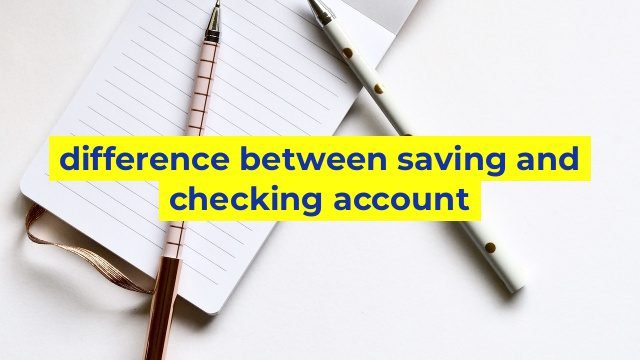Difference between Saving and Checking Account
When it comes to managing your money, opening a savings and checking account are two popular options. Although both accounts allow you to keep your money in a secure and reliable location, there are several differences between the two. Here we’ll discuss those differences.
What is a Saving Account?
A savings account is a bank account designed specifically for long-term saving goals. Savings accounts typically offer interest on the money you deposit, meaning that your money can grow over time. However, the interest rate on savings accounts is typically lower than other types of investments, such as stocks, bonds, or mutual funds. Savings accounts also come with limitations on the number of transactions you can make, so it’s not ideal if you need to make frequent withdrawals.
What is a Checking Account?
A checking account, on the other hand, is designed for everyday spending. It’s the account to which you deposit your paycheck and the account from which you draw funds to pay bills and make purchases. Checking accounts typically don’t offer the same interest rates as savings accounts, but they do come with other benefits. For example, you can make unlimited deposits and withdrawals from your checking account without incurring any fees.
Which Account is Better for You?
Whether a savings or checking account is better for you depends on your unique financial situation. If you’re looking to grow your money over time and willing to be more conservative with your spending, a savings account may be a good option. If you need access to your money more frequently, a checking account may be a better choice. Ideally, you should have both types of accounts for different purposes.
In conclusion, savings and checking accounts serve different purposes, and it’s important to choose the right account type for your needs. Consider the pros and cons of each account type and choose a bank that offers the best fees and interest rates based on your financial goals.
Table difference between saving and checking account
| Features | Saving Account | Checking Account |
|---|---|---|
| Interest | Higher interest rates | No or minimal interest rates |
| Minimum Balance | Higher minimum balance required | Lower minimum balance required or no requirement at all |
| Limitations on transactions | Limited number of transactions per month, exceeding which may result in fees or penalties | No or minimal limitations on the number of transactions |
| Availability of checks and debit card | No checks or debit card available, or limited usage | Checks and debit card available, more versatile use |
| Usage | Best for long term savings and for earning interest on funds | Best for day-to-day transactions like bill payments, deposits, and withdrawals |
